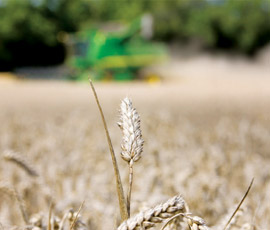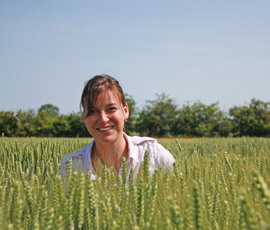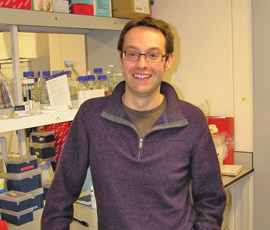New entrants on finding a career in arable

While it is difficult to start off in arable farming due to soaring land and machinery costs, David Jones and Luke Casswell look at four new entrants who have made it into the wider industry.
 Celia Bequain’s early desire to save the world led her to realise that plant genetics was the key to opening the door to improving crops and boost sustainable agriculture.
Celia Bequain’s early desire to save the world led her to realise that plant genetics was the key to opening the door to improving crops and boost sustainable agriculture.
Her enthusiasm was in breeding wheat suitable for low rainfall areas and this eventually led her to become the head wheat breeding at the British arm of the French plant breeder RAGT.
“My interest was breeding wheat for drought-prone Africa, so if I couldn’t save all the world then I could help save part of it,” she says.
Her passion for agriculture was nurtured by her grandparents who farmed in Burgundy, but her initial focus was to study the environment only to find many colleges oversubscribed.
“The hot topic then was the environment and all the courses were full so I was worried that I would never find a job,” Ms Bequain adds.
Growing up in Alsace, she studied agriculture at college before moving to university in Perpignan for a course in plant analytic chemistry and genotyping.
She returned to nearer home for a two-year master’s degree in agronomy and plant improvement and realised that further study would have to be in the public sector or to undertake a PhD.
After six years of study, she was keen to get into the plant breeding world and use her interest in genetics to start improving crops and the farming industry.
Her final years of study included training periods in areas such as wheat and linseed breeding and looking at wheat resistance to fusarium ear disease so opening a path into plant breeding.
In 2006 she joined RAGT, which is the breeder that gave British growers Hereward, Cougar and Relay winter wheat varieties and has high hopes for the new breadmaker variety Skyfall.
When the head wheat breeder left for a rival group six year later, the 35-year-old Ms Bequain took over as chief breeder in November 2012 at its headquarters on the Essex-Cambridgeshire border.
Skyfall and an early-drilling feed wheat Icebreaker, both from RAGT, are favourites to make it on to the HGCA Recommended List of winter wheats later this year.
 James Mayes grew up close to farming in a rural village and had a clear goal from a young age of being a farm manager.
James Mayes grew up close to farming in a rural village and had a clear goal from a young age of being a farm manager.
He is now in charge of a 1,100ha farm in Bedfordshire, having worked his way up Sentry’s farm manager programme.
Achieving it was not easy, though, and Mr Mayes urges those wishing to get into the industry to be 100% sure they want it.
After school, Mr Mayes spent two years of study at an agricultural college, but he still managed to work on a farm looking after a small herd of Herefords.
“It’s one thing I would advise all young farmers to do – get as much experience as you can, even in sectors of the industry you may not wish to work in,” he says.
“Getting experience was one of the hardest aspects when I was younger and I was lucky in getting work at the local estate,” he adds.
Returning to that estate after college was the perfect stepping stone for getting his foot on the ladder with Sentry.
“I saw it advertised in Farmers Weekly and managed to get on the trainee farm manager programme and worked my way up from there,” he says.
Starting as an assistant farm manager, Mr Mayes notes one of the big draws was working across a range of soils and crops to add to his experience.
Gradually gaining more responsibility, the 33-year-old says working with Sentry has provided him with a proven career ladder and helped him achieve his goal.
Throughout his nine years with Sentry he has continued to look for new experiences and qualifications, having recently passed his BASIS examination.
Sentry is one of Britain’s biggest farming companies, managing 20,000ha of predominantly arable land, with farms from south Dorset to near Edinburgh.
“It took me six years before I got a farm in my own right, but my role progressed as my skills progressed and then I finally got this farm manager job,” he says.
 Chris Burt’s interest in genetics and mapping the wheat genome opened up an award-winning career searching for resistance to damaging cereal diseases like eyespot and fusarium.
Chris Burt’s interest in genetics and mapping the wheat genome opened up an award-winning career searching for resistance to damaging cereal diseases like eyespot and fusarium.
The advances made which allowed molecular makers to be used to tag traits, such as disease resistance, encouraged his enthusiasm for genetics at the John Innes Centre in Norwich.
This year he was awarded an Early Career Excellence Award from the MonoGram group of researchers on eyespot and this work was also recognised by the House of Commons.
“We have been trying to understand resistance to eyespot and look at introducing resistance from a wild relative of wheat,” he says.
After an initial degree in the Biological Sciences of Agriculture at Aberdeen University, his interest in genetics came to the fore during a MSc degree in plant breeding at the University of East Anglia.
He then spent four years in ornamental plant breeding at Floranova before returning to academia at the John Innes Centre to study eyespot as part of his PhD.
His breakthrough on eyespot came by producing genetic markers near to a source of resistance taken from the relative of wheat which is now being used in some modern commercial varieties.
This Pch1 resistance gene is being incorporate into new varieties and offers a higher level of resistance to the disease, which causes annual crop losses of £15m in Britain.
This resulted in the 34-year-old Dr Burt winning a bronze award given by parliament for early stage research, and picked up £1,000, which he plans to spend on a mountain bike.
He has now moved his attention at the John Innes Centre to fusarium, and is working with Paul Nicholson on the disease which wrecked many wheat crops in the wet harvest of 2012.
“We are continuing to work to make varieties more resistant to a range of diseases,” he says.
He particularly enjoys his time spent in the field as his type of work needs a lot of data, and believes there is much work to do in understanding genetics even before using genetic modification.
 Alan Willis is living proof that you don’t have to come from a farming background to work in the wider arable sector.
Alan Willis is living proof that you don’t have to come from a farming background to work in the wider arable sector.
He has just spent his first year working as an agronomist with advisory group Hutchinsons, after a degree in geography and a MSc in agronomy.
Entry to the company’s three-year training programme comes after a tough selection process, which Mr Willis prepared for by working with agronomists and also on trial plots.
“Probably one of the most important bits is getting out there to gain work experience with anyone you can,” he says
Coming from a non-farming background and with an unrelated first degree, the 29-year-old Mr Willis was keen to immerse himself in arable farming.
“Getting more practical experience and trials work was a good link from the science world to the more practical agronomy world,” he adds.
Although only in his first year, Mr Willis has already acquired the industry-standard qualifications, such as BASIS, to allow him to give on-farm advice.
However, the training goes much further, to give the next generation of advisers a broad set of skills and the confidence to suggest new approaches to farmers.
He admits that it’s a big step to have taken the typical “research” route into farming, but says he is thriving with the practical side.
“You have to be fairly sociable and willing to go up farm drives to speak to farmers,” he says.
“The main thing is to know that you want to do it and work hard at it. I know it’s difficult, but the opportunities are there,” he says.
The Hutchinsons’ Foundation, now in its fourth year, has seen 17 trainees complete the programme, 14 part complete and has just taken on five new trainees this month.
Hutchinsons is also sponsoring a number of students to complete masters degrees before they join the foundation.
See more on careers in farming on our young farmers pageIf you have any interesting experiences of entering or even exiting the arable farming industry please let us know by emailing farmers.weekly@rbi.co.uk or write to us at Farmers Weekly, Quadrant House, Sutton, Surrey SM2 5AS.

